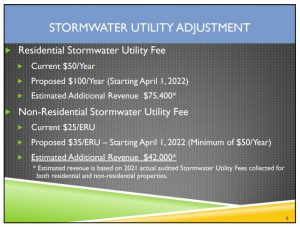
BERLIN– Elected officials are expected to continue discussions regarding proposed stormwater rate increases in the coming weeks.
Though a presentation last week called for raising both the commercial and residential stormwater fees in Berlin, council members made no decisions regarding changes. Mayor Zack Tyndall said he’d be working with staff to develop a formal recommendation for a way to improve the stormwater fund’s financial position.
“We really just can’t let this linger for too much longer,” he said. “I do want to make sure that on the 14th we can continue this discussion while its fresh in everyone’s minds.”
Darl Kolar of EA Engineering, Science Technology, the town’s stormwater consultant, reviewed the town’s stormwater fee structure with elected officials at last week’s council meeting. He reminded officials that the utility, when it was initially created in 2013, was funded both by the annual fees ($50 per residence and $25 per 2,100 square feet of impervious surface at commercial entities) as well as by support from the general fund. Between the two revenue sources, the fund had the finances necessary to apply for various grants. Those grants allowed for projects such as the submerged gravel wetland on Graham Avenue.
When the subsidy from the general fund ceased a few years ago, however, the stormwater fund began to struggle financially.
“It’s closing its year in the negative with an operating loss…,” said Natalie Saleh, the town’s finance director. “Because of the overall financial health of the fund we cannot sustain it. The stormwater fund is a business fund it should operate at a profit.”
Kolar said that while the town had completed various stormwater projects since the fund was created, there were still numerous improvements that needed to be made. As a result, he said an adjustment to the fee structure was needed to improve the financial capabilities of the fund. In 2019, the fund had an operating loss of $98,796. In 2020, it had an operating loss of $74,430. In 2021, there was an operating loss of $101,512.
Kolar proposed increasing the residential stormwater fee to $100 a year beginning April 1. He suggested increasing the commercial stormwater fee to $35 per ERU (equivalent residential unit—2,100 square feet of impervious surface). For residents, the change would mean their monthly stormwater bill of $4.16 would double. The changes would generate nearly $120,000 in additional revenue for the stormwater fund.
Saleh said the additional revenue would cover the fund’s operating loss. When it ends a year in the negative, that loss is covered by the general fund. Saleh said as long as that occurred the stormwater fund was just repeating the problems the town’s sewer fund had experienced in recent years.
Councilman Troy Purnell spoke in favor of raising the fees and pointed out that the fund needed to be in a positive position to seek grants or loans. Councilman Jay Knerr expressed concern about adjusting the fees, particularly since earlier in the meeting the council discussed implementing new water and wastewater fees.
“You’re hitting people hard and you want to do this right away,” he said. “I understand the need to right these funds and make them solvent but I think we should be doing this at the start of our next fiscal year, not immediately.”
Purnell said officials had been talking about these issues for some time. he added that even though he’d objected to the concept of a stormwater fee when it was proposed, he’d seen how the fees had enabled the town get millions in grants.
“There’s a lot of work that still needs to be done,” Purnell said. “I’d much rather get it out of a grant than the taxpayers.”
Councilman Dean Burrell said he thought the public should have a chance to weigh in on the proposed increases.
Tyndall said he didn’t like to ask citizens for more money but stressed that the professional opinions the town received—from its finance staff, its consultants and its auditing company—stated that enterprise funds needed to break even. Town Administrator Jeff Fleetwood agreed.
“We’re going backwards with this fund,” he said.
Councilman Jack Orris questioned the money the stormwater fund already owed the general fund. Salah said officials could consider repaying that slowly in a few years.
When Burrell again said he’d like to hear from the public regarding the increases, Tyndall said he’d work with Saleh and the town’s consultants to come up with a formal recommendation to present at the council’s Feb. 14 meeting.
“That way we have something to base the discussion on,” he said.

